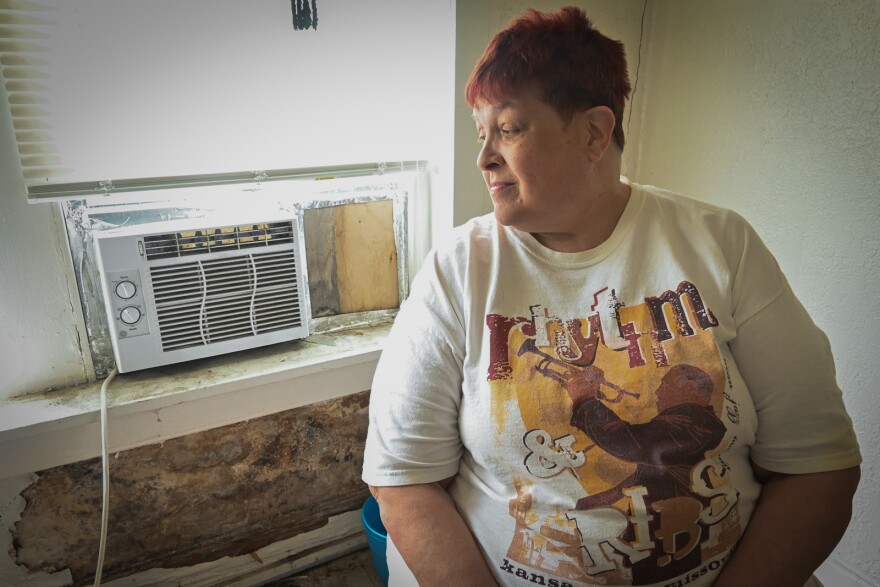Between July and August this year, Kay Id’s utility bills shot up nearly $200.
While she’s used to energy bills increasing from spring to summer, this year felt worse. The walls of her apartment near 48th Street and Paseo Boulevard have little insulation, making it hard to contain air conditioning.
The drywall is ripped away in some parts of her apartment’s walls, revealing mold.
“All my heating and cooling go, it's kind of out the window, and that's why my bills are so high,” Id says.
Id suffers from a number of chronic health issues – COPD, asthma, osteopenia and osteoarthritis – that are exacerbated by the heat. And Kansas City has seen record high temperatures this summer.
Her health issues also make it hard for her to work – Id is on a fixed income. And between the heat and inflation, she is struggling to get by.
“It's hard for me to manage,” Id says.
Id is not alone. Thousands of Kansas City residents are struggling to pay rent and utility bills — to the point where utility companies are threatening to pull service.
The number of customers of Evergy Metro, which covers the Kansas City area, who received final disconnection notices for non-payment in May and June nearly doubled since last year, according to the Missouri Public Service Commission. (Numbers were not yet available for July or August.)
In May and June 2021, just under 10,000 people received disconnection notices. This year, more than 19,000 customers were notified.
Utility disconnections
Some experts say the increase in utility bills is a result of a combination of factors — people who suffered a loss of income during the pandemic, high fuel costs, supply chain issues, inflation and dangerously high temperatures.
“It's sort of a perfect storm of options and things that are taking place,” says Geoff Marke, chief economist with the Missouri Office of Public Counsel.
Evergy communications manager Gina Penzig told KCUR that over the last five years, Evergy’s rates have been lower than the rate of inflation.
The surge in service disconnections over the last year can also be attributed to a backlog from the COVID-19 pandemic: Evergy halted service disconnections from November 2020 to May 2021, according to Penzig.
During that time, Penzing said the company helped secure millions of dollars in federal and state utility assistance for customers. While Evergy has returned to normal operations, it says it’s giving customers more notice and continues to offer bill assistance.
And many Kansas City residents clearly still need the help.
Metro Lutheran Ministries is one of several organizations offering help to Kansas City residents struggling to pay bills. Case manager Stephanie Winn says they’ve used more than $300,000 of the $500,000 of the assistance money from private and federal funding since May 1, 2022.
Climate change's impact
The metro has experienced several extreme heat waves this summer. In July, Kansas City saw temperatures hit triple digits for the first time in four years. The region also experienced unusually warm nighttime temperatures.
All this meant residents spent more time indoors, increasing air conditioning usage.
For people already struggling to pay rent — which itself increased this summer — the added cost of running air conditioning was not insignificant.
Beth Pauley, who works with the Kansas-based Climate + Energy Project and is on the Kansas City climate protection steering committee, says residents with high utility bills are at more risk for evictions, and she worries it will only get worse.
According to climate research non-profit First Street Foundation, Missouri is in the center of the “Emerging Heat Belt.” This is an area where heat indexed temperatures are likely to hit 125 degrees by the year 2053, due to climate change.
“The greater impacts of climate change are going to exacerbate the issues of high utility bills,” Pauley says.
For Kay Id, the high utility bills make a precarious housing situation even worse. She’d like for her landlord to help make her apartment more energy efficient.
"When property owners don't take care of their buildings, it causes their rent and utilities to go up,” she said. “The utility companies need to work with landlords to make buildings more equipped for higher utilities.”






